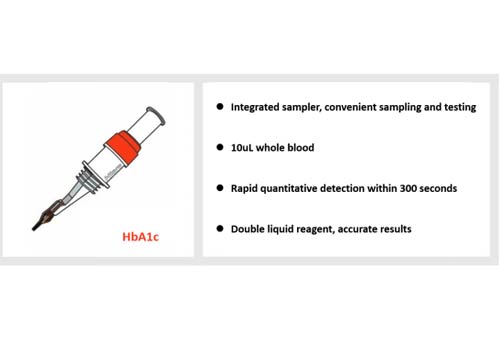Glycohaemoglobin (GHb) is the product of the combination of hemoglobin in red blood cells and sugar in serum and is composed of HbA1a, HbA1b, and HbA1c, of which HbA1c accounts for about 70% and has a stable structure, so it is used as a monitoring index for diabetes control. HbA1c is known as the "gold standard" for diabetes monitoring because it can reflect the average blood glucose level of an individual for 1-3 months and is not affected by factors such as fasting or insulin use.
This article will try to explore four of the common misconceptions that exist about the testing program.

Q: Is the value as normal as possible or as low as possible?
A: The reference value for HbA1c is somewhere between 4% and 6%, which may vary slightly from guideline to guideline and expert consensus, but 4% to 6% is a generally accepted normal range.
First of all, why not lower is better. This is easy to understand. Blood sugar is an important energy source for the human body. The low value of HbA1c reflects the long-term low blood sugar of an individual, and may even be dangerously low for some periods of time. In terms of risks and benefits, hyperglycemia is a chronic disease, while hypoglycemia can directly threaten life.
Q: What about the normal range?
A: It depends. The treatment of diabetes emphasizes the principle of individualization, and the control standards are different for each person and even at different stages of each person. There is no universal standard scope in the absolute sense. In addition, even if someone's HbA1c readings are consistently good, their blood sugar fluctuates wildly, and that doesn't mean their blood sugar is under control.
Q: Is it possible to detect glycosylation without detecting blood sugar?
A: Detecting blood sugar can be a hassle and can add up to a lot of costs. Some diabetics may think that since HbA1c reflects the previous months 'blood sugar levels, I should test it every few months instead of every day.
The answer is no. As mentioned earlier, HbA1c test kit has its limitations and does not reflect individual blood sugar fluctuations. In extreme cases, such as explosive type I diabetes, HbA1c values do not change as quickly as those of acute blood sugar. Alcohol abuse and elevated triglycerides are both associated with higher levels of HbA1c. Hemolytic anemia and chronic renal failure may lead to a decrease in the value of HbA1c.
Q: Like blood sugar, does HbA1c need to be retested irregularly?
A: Patients who are first diagnosed with diabetes will usually be asked to have an HbA1c test. After that, depending on the treatment, the doctor will generally recommend a quarterly, semiannual, or annual test. For ordinary days, it makes more sense to monitor blood sugar.
Q: Does HbA1c need to be tested on an empty stomach?
A: No, HbA1c reflects an individual's blood sugar control level within 1 to 3 months. Dietetic behavior on the day of the test has no significant effect on this value. But it's a good idea to ask your doctor because it's probably not the only thing we're testing for that day.
